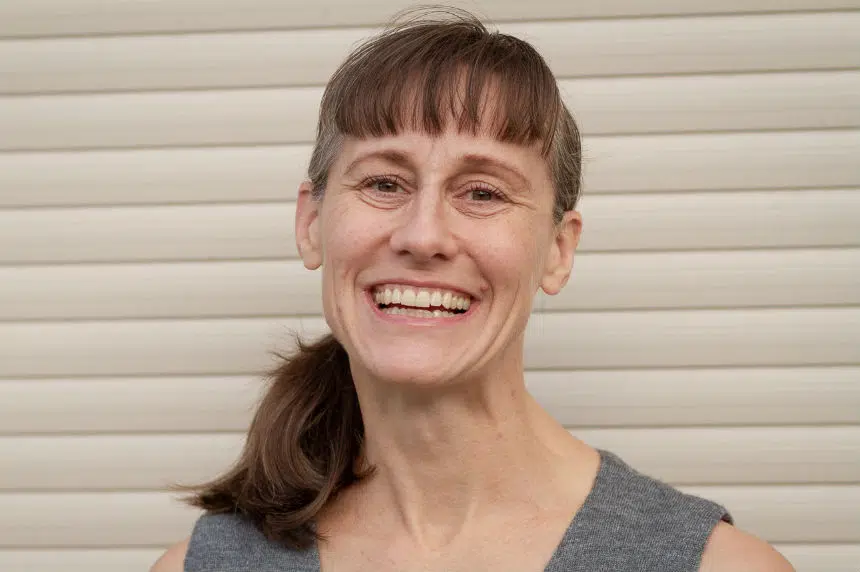Personal details. Name, age, hometown
Kerri Wall, 48 years old, born and raised in Saskatoon until I was 20; currently living in Fernie, B.C.
Tell us about yourself
I work full-time in the world of municipal planning and healthy public policy. I am employed by Interior Health, one of the five geographic health authorities in British Columbia. I was part of the team that created the program I work in — Healthy Communities — advising and facilitating with local governments to build healthy communities.
I’ve been working for Interior Health since 2010. I have a master of arts degree in leadership and training from Royal Roads University (2006) and certificates in negotiation (2013) and third-party mediation (2014) from the Justice Institute of B.C. Outside of my full-time job with Interior Health, I do mediation and conflict coaching in private practice. I also work in the women’s leadership development space organizing and facilitating workshops and retreats.
I have a son who is turning 23 this fall who graduated in June from Camosun College on Vancouver Island with a bachelor’s degree in business administration.
I am ambitious, athletic, and activism-oriented. Somewhat academic. My values are connection, curiosity, courage, consciousness, and congruence.
What’s a little-known fact about you?
I have a condition called acquired anosmia, which means I lost my sense of smell (in May 2018). This means I can’t really taste anymore either. So food is mostly dead to me
Why should voters hire you?
Voters should hire me because the Green Party of Canada is the only federal party with a climate plan (Mission: Possible) that has articulated actions that will help our nation fully deal with the global climate emergency. Elizabeth May is the most trusted federal leader on environmental issues with an incredible record of integrity and activism.
We must not abandon our responsibility to protect our home — Mother Earth. Young people are furious that adults have made such a mess of things; it’s time we took responsibility and action. The Greens understand the interconnected crises we face of mass extinctions, climate change, income and wealth inequality, and colonialism/genocide/racism.
Who should we call for a reference?
The Green Party candidate in Kootenay-Columbia, Abra Brynne.
What is your greatest strength? What is your greatest weakness?
I’ve got three main strengths:
Curiosity and the desire to understand: I strive to understand the thoughts and feelings of others and to increase my comprehension of situational dynamics. Continual learning keeps my mind fresh and engaged.
Empathy and the ability to connect: Relationships are the foundation of everything that ever happens in the world. Listening to people — especially when emotions run high or disagreements surface — helps us move forward.
Big-picture thinking: Getting underneath appearances to recognize the causes of the causes of our current intersectional crises is essential. Seeing how power and resources are unfairly distributed and hoarded is the big-picture view we really need to act towards social justice.
My main weakness: I burn the candle at both ends; my ambition can prevent me from practicing proper self-care, particularly when it comes to getting enough sleep. I feel excited about the opportunities embedded in the challenges we face and eager to help solve them. But I won’t be useful if I’m burnt out.
Where do you stand on:
Gun laws? In my life I have been both robbed at gunpoint and threatened with an assault rifle. These experiences inform my position. We need to understand the data about gun violence and treat that information as we would treat statistics about a measles outbreak, for example, because gun violence is a public health and safety issue. With an accurate picture, including links between firearms and domestic violence (which is almost always male-on-female violence), gun laws should be made and amended according to population health recommendations.
The need for more pipelines? In order to keep global warming below 1.5 degrees Celsius and meet our commitments to the Paris Climate Agreement we need to rapidly halt our greenhouse gas emissions. Global climate change is the greatest threat to the health and well-being of our children and future generations; they will never forgive us if we fail to act. Therefore, no more pipelines.
Western alienation? The term “western alienation” is really about the desire for shared prosperity, shared power, and the need for a more fair electoral system across the country. The term “western alienation” is a description of a problem (we feel alienated!) but I think it’s helpful to frame the issue in terms of what solution is needed. Language like “shared prosperity” tells people what NEEDS TO HAPPEN for our nation to move forward together and it frames the issue in a way that everyone can get behind. Changing our electoral system to one of proportional representation would really help in solving this issue.
China? What should our approach be with some of our markets blocked? We need to understand the Chinese involvement in not only the Canadian economy, but what their strategic direction is in this regard around the world. China is a global superpower and they are buying up land and businesses around the world, so we must navigate our involvement with them open-eyed. We need to fully engage with the People’s Republic of China, encouraging a collaborative relationship, and be firm about human rights. They are trying to buy into oilsands and natural resources around the world, so we should also be strategic in our relationship with them.
Are we facing a climate change crisis? Is carbon tax the answer? Carbon tax is one of the answers; real climate action requires many bold actions taken in concert. Supporting programs like net metering to meet the demand for solar and continuing to develop wind energy are crucial and are strategies that work especially well in Saskatchewan. The Greens also want to establish an inner cabinet of all parties to tackle this urgent crisis in a non-partisan way; climate change action should not be about “politics.” We want to see 60 per cent GHG reductions against 2005 levels by 2030; zero emissions by 2050, and this means that in addition to a carbon tax we promise to restore carbon sinks, ban fracking, and more.
It’s a day off and you can do anything you want. What would it be?
Sleep in. Exercise. Reflect. Hang with friends and family. Play.
Who inspires you?
Elizabeth May, Autumn Peltier and Greta Thunberg.
What is your hidden talent?
Lame gymnastics. I can briefly handstand and my splits are passable.
What do you wish you could do but can’t?
I wish I could hit the gap line on the Fernie dirt jumps and clear them all. I wish I could close the loopholes that allow corporations to defer paying their taxes owed.
Who are the three people, dead or alive, that you’d love to have dinner with?
Angela Rickman, political director of the Green Party of Canada; Melissa Bruno, national director of the federal NDP; Anita Nickerson, executive director of Fair Vote Canada. I would love to have dinner all together, the four of us, to talk about strengthening/uniting the progressive/left vote.
How do you take your coffee?
I don’t drink the stuff! Never have!
What’s the one album you’d take with you on a desert island? What embarrassing song do you admit to on your playlist?
Pretty Lights — Filling up the City Skies (double album). I’m not embarrassed to say that I don’t have any playlists.
What is your guilty pleasure?
Reading books or watching news while in the bathtub.
What is the last book you read?
Save Your City: How Toxic Culture Kills Community & What to Do About It, by Diane Kalen-Sukra.
What is your favourite TV show? What are you binge watching?
I don’t watch TV. But if you were to ask me about podcasts … I love Policy Options, The Next System Project, Change Everything, and many more.
What is your all-time favourite movie?
Tomorrow Ever After.







